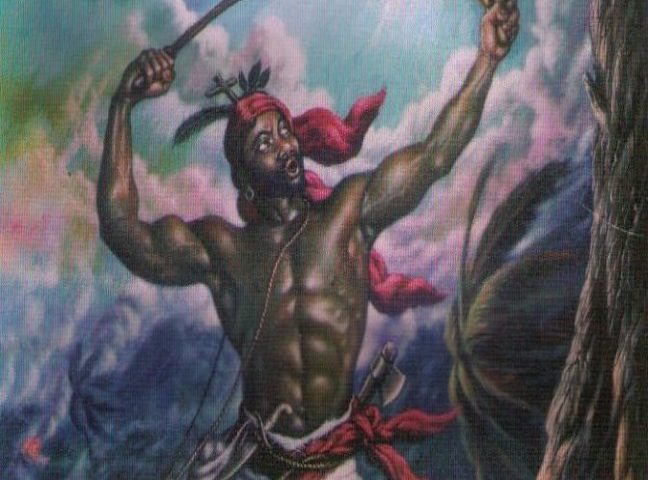
A Flawed Hero
May 17, 2017
The Opening
May 20, 2017By Satish Sekar © Satish Sekar (May 15th 2017)
Boukman
Men of Colour (Mulatto) leaders, Vincent Ogé and Jean-Baptiste Chavannes, had been martyred in February 1791, but rather than crush expectations of equality and political rights, it united blacks and Mulattos. Seething resentment festered in both. It took just six months to boil over, but it came from a thoroughly unexpected source.
‘Dutty’ Boukman – his real name is lost to history in favour of this derogatory name that loosely means ‘Dirty Muslim’ – was a Voodoo Priest and slave. His origins are unclear – some claiming that he was a Muslim, Jamaican, or Maroon who was sold by his British owner in Jamaica to a Frenchman in Haiti – a frequently used measure for ‘hard to manage’ slaves. Others say his origins were in Haiti, pointing to others with the name Bouqueman – hardly conclusive proof.
The Revolution Begins
However, it matters not – his importance came in his actions in Haiti. On August 14th 1791 Boukman officiated at a Voodoo ceremony at Bois Caïman – that makes it most unlikely that he was a Muslim. Slaves aired their grievances, sacrifice was made and the Haitian Revolution against slavery began. But important though Boukman was to the revolution, he was not alone in issuing the call to revolt for freedom.
Cécile Fatiman – a Mulatto slave as was her mother – also played a leading role in the ceremony and in stoking the anti-slavery flames. She organised and presided over the ceremony with Boukman. Her role is often forgotten or minimised. It should not be. Her role was equally important. She is the Mother of the Haitian Revolution, as Boukman was its Father, and ultimately she was a far more successful leader than Boukman.
Contradictions
Fatiman illustrates the hypocrisy of Ogé’s position – it wasn’t even equality for Mulattos. It was equality for freed Mulattos. Where would that leave Mulatto slaves like Fatiman? The contradiction required the Revolution to resolve, and a leader of the quality and integrity of Alexandre Pétion. Unlike Ogé, Pétion, despite his privilege and support of Mulatto rights, would not support slavery.
Pétion had fought against the revolutionaries twice, but his fight was for Mulattos, not to restore slavery. He would prove this later, as he deserted Napoléon Bonaparte’s invasion force, taking his followers over to the side of the Revolution, and later funding and supporting anti-slavery and independence movements. Pétion became a giant of liberation movements.
With the ceremony at Bois Caïman the revolution against slavery that would lead to the first independent black nation in the modern world had begun.
The Baton is Passed
Boukman’s leadership didn’t last long. In November 1791 he was captured and beheaded. His head was displayed to cow resistance, but the revolution had begun and would continue without Boukman. Toussaint Breda was an educated slave, but he was not subject to the savage regime that ultimately bred its own destruction. He was an unlikely leader, but proved to be a gifted one.
The Haitian regime was brutal. It consumed the lives of slaves quickly – Haiti was incredibly productive, but that depended on squeezing every drop from the slaves. It devoured them, requiring constant replacements. This is an important issue. It explains British hypocrisy over slavery – The Great Betrayal will be published soon. He joined the revolution and became its leader, but Toussaint would eventually be devoured by the revolution, as it outgrew his limits. Cécile Fatiman, meanwhile, would live a long life – over a hundred years – and she would become Haiti’s First Lady, due to her marriage to the Mulatto General of the Revolution Jean-Louis Michel Pierrot, who became Haiti’s 7th President in 1845. It was a short Presidency, but Fatiman had established herself as one of Haiti’s greatest children.


